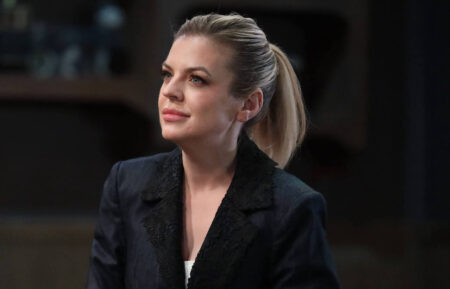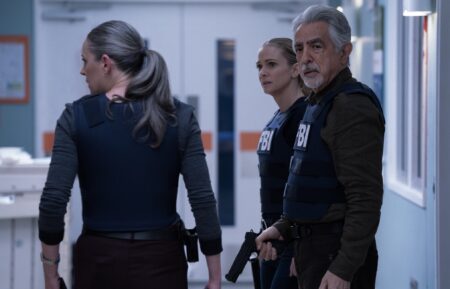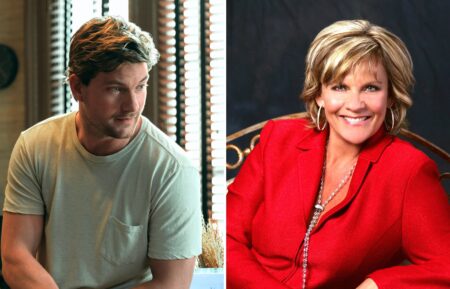‘The Undoing’ Episode 5: Jonathan Just Can’t Stop Lying (RECAP)
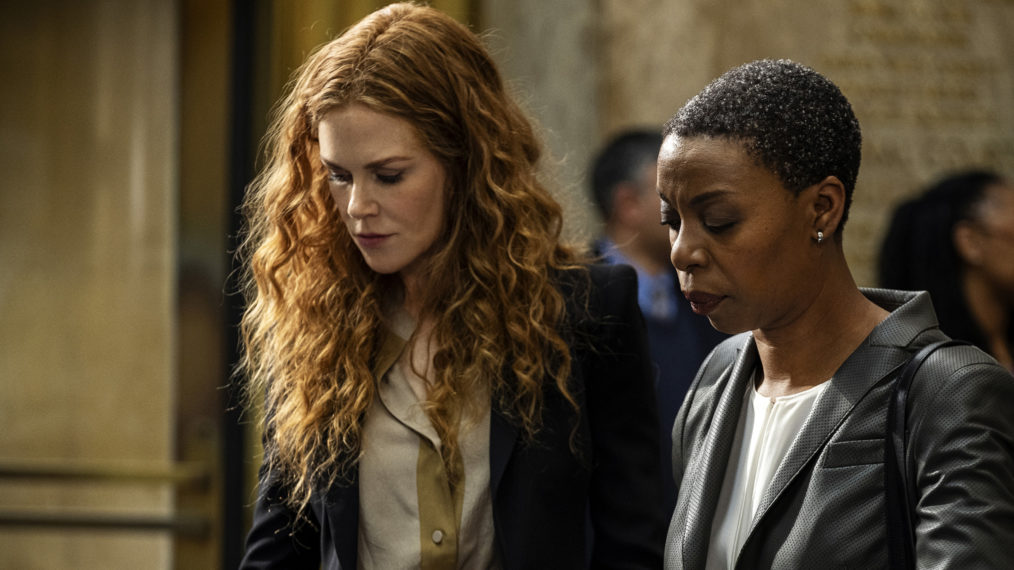
Spoiler Alert
[Warning: The recap below contains spoilers for The Undoing Season 1, Episode 5, “Trial By Fury.”]
The Undoing drops another bombshell in the penultimate episode of the season, and surely this one can’t be so easily brushed aside like Grace’s (Nicole Kidman) security-cam footage? Of course, I’m talking about the dreaded sculpting hammer, the alleged murder weapon. I think we all knew the hammer was the show’s smoking gun and that it would come back into play at some point. However, I will admit that I never expected it to be concealed inside Henry’s (Noah Jupe) violin case.
Before we jump into the hammer discovery and our theories, though, let’s deal with Jonathan’s (Hugh Grant) trial, which finally begins this episode. Hayley (Noma Dumezweni) sets her objectives: It’s all about projecting a specific image and then creating muck. In terms of image, that is the responsibility of Grace and Jonathan. Their task is to present themselves as a loving, supportive couple. Jonathan has to use his charm and compassion while explaining why he is innocent, and Grace has to show that she believes in her husband. It’s not an easy task, especially after Jonathan creates a further rift when questioning Grace over why she was walking near Elena’s (Matilda De Angelis) studio on the night of the crime.
However, Jonathan is well-practiced in getting what he wants. And slowly but surely, he starts to win Grace back over. He calls her in the middle of the night, cracking jokes and reminiscing about the good times. He reminds her of how they used to talk of growing old together. Despite her initial reluctance, Grace eventually heads over to the apartment to spend the night. There is still a part of her that wants to believe in him, not just regarding his innocence, but that he is still the man she fell in love with — the sweet, caring, charming doctor. But just when Grace lets her guard down, she is suddenly jolted back into reality after another lie comes to light and shatters Jonathan’s perfect image.
Returning home to find a troubled Henry sitting alone, Grace wants to know what’s wrong. She can tell something is bothering him beyond the trial itself. That’s when Henry admits that he saw his dad with Elena months ago, outside of his school. While he never saw them kiss, he could tell from the interaction what was going on. And the worst thing is, Jonathan caught Henry looking, and all he did was smile and wave. Jonathan knew that Henry knew, and he didn’t care. Now, Henry is beating himself up for keeping this a secret from his mother. He feels guilty because maybe all of this could have been avoided had he said something, but he was scared and wanted to protect his dad.
Grace doesn’t blame Henry; she rightly aims her ire at Jonathan, snapping at him in front of Hayley for putting their son in that position. This only serves to drive a further wedge between the couple, much to the irritation of Hayley, who desperately needs them on the same page. If they show any signs of dissension, it could severely impact Jonathan’s case. After all, it’s not just the jurors who are watching, but the press and public with their ever-present camera phones. Grace and Jonathan are under a microscope, every interaction observed and analyzed. If it looks like Grace doesn’t trust and believe her husband, then how is the rest of the world supposed to react?
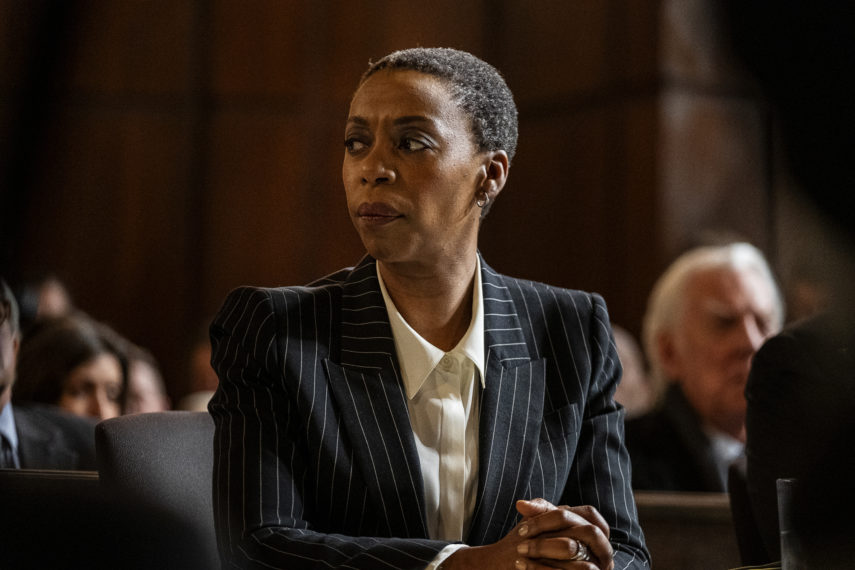
HBO
With Grace and Jonathan struggling to play their part, Hayley has to up her game when it comes to “creating muck.” She needs to prove there is reasonable doubt, and she does that by picking holes in the police investigation. While Hayley doesn’t deny that Jonathan had sex with Elena on the night of the crime nor that he found her body and fled, she argues that the investigation was too narrow, and that the police ignored other potential suspects, like Elena’s husband, Fernando (Ismael Cruz Córdova). Hayley throws doubt on Fernando’s alibi, which turns out to be his 10-year-old son, Miguel (Edan Alexander), and brings up his potential motive as an angry, jealous husband who didn’t truly know everything about his wife.
There is no actual evidence against Fernando, but Hayley’s mission is only to create doubt. And she succeeds at that when she questions Detective Mendoza (Édgar Ramírez) on the stand. When asked if there was anyone else at the scene that night, Mendoza says no. That’s when Hayley shows the security-cam footage of Grace walking nearby. And yet, despite this, Grace was never questioned as a suspect. Mendoza says it’s because Grace was walking past Elena’s studio, and on top of that, they didn’t find any of her DNA at the crime scene. Hayley asks if Grace would have been treated as a suspect had her DNA being at the scene, to which Mendoza answers yes. “Then why wasn’t Fernando?” she asks, pointing out that his DNA was found at the scene.
Hayley does a fantastic job of tying Mendoza in knots and getting Fernando to show his (justified) anger on the stand when she starts asking about Elena’s psychological problems. Now, if Jonathan can add to this by using his charm to appeal to the juror’s biases, there is a good chance they could win this case. After all, as the news media points out, American juries are reluctant to punish privileged, good-looking, successful, wealthy white men.
Let’s face it, despite suspicions of Franklin (Donald Sutherland) last week, it’s a near certainty that Jonathan is the killer. Everything about his life is BS; even the story about him being responsible for his childhood dog’s death is made up. Jonathan tells Grace that it was actually his baby sister who died! He was meant to be babysitting her, and she got out into the street where she was hit by a car. Jonathan projects this image of deep regret, a burden that he can’t bear to even think about, and so that’s why he never talks of it, and that’s why he no longer speaks with his family. “Maybe that’s why I became a pediatrician,” he says, in a line that made me groan. But it was meant to make us groan because, again, this is Jonathan performing.
When Grace calls Jonathan’s mother, we find out that, yes, Jonathan’s little sister was killed, but Jonathan never showed grief nor regret. He never even said he was sorry! After it happened, he never spoke of it again, and when he was old enough, he left the family home and cut all ties. Jonathan is a grade-A sociopath. He has no conscience or regard for others. His emotions are merely learned and mimicked. So of course he is the type of person capable of bludgeoning someone to death and then going about business as usual. And when Grace finds the sculpting hammer, the supposed murder weapon, hidden inside Henry’s violin case, it all but cements Jonathan as guilty.
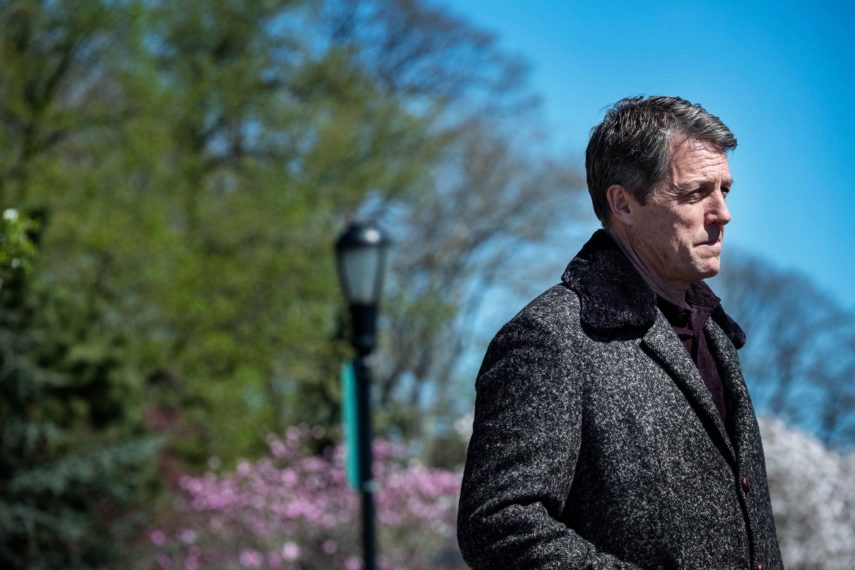
HBO
I don’t for one second believe that we’re meant to see Henry as the killer — that’s too ridiculous even for this show. And while I suppose there is an outside chance that Franklin hid the weapon there (we have seen him in Henry’s room before), it’s perhaps a little far-fetched. What makes the most sense is that Henry would protect his father, just as he did when he found out he was cheating on his mom. Jonathan’s charm and manipulations work on everyone, but no one more than his adoring son. It’s easy to see why a frightened Henry, who we know is desperate to keep the family together, would lie to protect his dad. It also makes sense why Henry felt so guilty, not just because of the cheating thing, but because he knows his dad killed Elena.
There is always a chance with this show that there will be another swerve that could end up undermining everything we’ve seen in this episode. That’s why I’m reluctant to go all-in on this theory. However, given everything we’ve seen, I’d be surprised if next week Jonathan’s charm doesn’t run out and he’s convicted of murder.
The Undoing, Sundays, 9/8c, HBO





